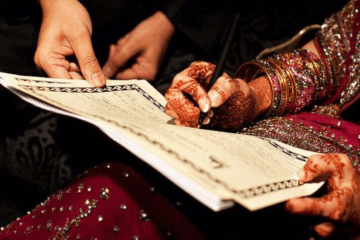
Nature of Muslim Marriage
Marriage according to the Mohamedan law is not a sacrament but a civil contract. So, the rights and obligations it creates arises immediately and, are not dependent on any condition precedent such as the payment of dower by husband to wife.
Marriage, also known as nikah, can be defined to be a contract which has good its object the procreation and legalizing of children.
In Hasina Bano v. Alam Noor, the Rajasthan High Court observed that unlike Hindu Marriage, which is a sacrament, according to Islamic Law, a marriage is a permanent and an unconditional civil contract made between two parties of opposite sexes with a view to mutual enjoyment and procreation and legalizing of children. Further, since the concept of contract is the basis of marriage, the principles of valid contact must should be applied here.
Similarities between a Contract and a Marriage
As has been established, there are certain similarities between a contract and a nikah. The essentials of a valid contract include the following:
- Proposal
- Acceptance
- Consideration
- Free Consent
- Lawful Object
- Competency of Parties
For a nikah, the following conditions must be fulfilled:
- Ijab (proposal)
- Qubool (acceptance)
- Dower (consideration)
- Free Consent
- Object (procreation of children)
- Competency of the parties.
However, nikah can be distinguished from civil contract for the following reasons-
- It cannot be done on the basis of future happening unlike the contingent contract.
- Unlike the civil contract it cannot be done for a fixed period of time (except for Muta Marriage or temporary marriage)
Capacity for Marriage
Every Mahomedan of sound mind, who has attained puberty, may enter into a contract for marriage.
Lunatics and minors who have not attained puberty may be validly contracted in marriage by their guardians.
A marriage of a Mahomedan, who is of sound mind and has attained puberty, is void, if it is brought about without his consent.
When consent to a marriage has been obtained by force or fraud, the marriage has been obtained by force or fraud, the marriage is invalid unless ratified.
Further, the provisions of Indian Majority Act, 1857 do not apply to matters relating to marriage, dower, and divorce. A Mahomedan wife who has attained puberty and is under eighteen years of age may file a suit for divorce without the appointment of a next friend.
Essentials of Marriage
It is essential to the validity of a marriage that there should be a proposal, made by or on behalf of one of the parties to the marriage, and an acceptance of the proposal by or on behalf of the other, in the presence and hearing of two male or a male and two female witnesses, who must be sane and adult Mahomedans. The proposal and acceptance must both be expressed at one meeting; a proposal made at one meeting and an acceptance made at another meeting does not constitute a valid marriage.
Registration of Marriage
Muslim Law does not require registration of a marriage as a requisite for a valid marriage, however, it does not prohibit either. A Muslim marriage can be proved by direct evidence by establishing prolonged, continuous cohabitation or an acknowledgement by the man of the paternity of the child or an acknowledgement that the particular woman is his wife.




0 Comments